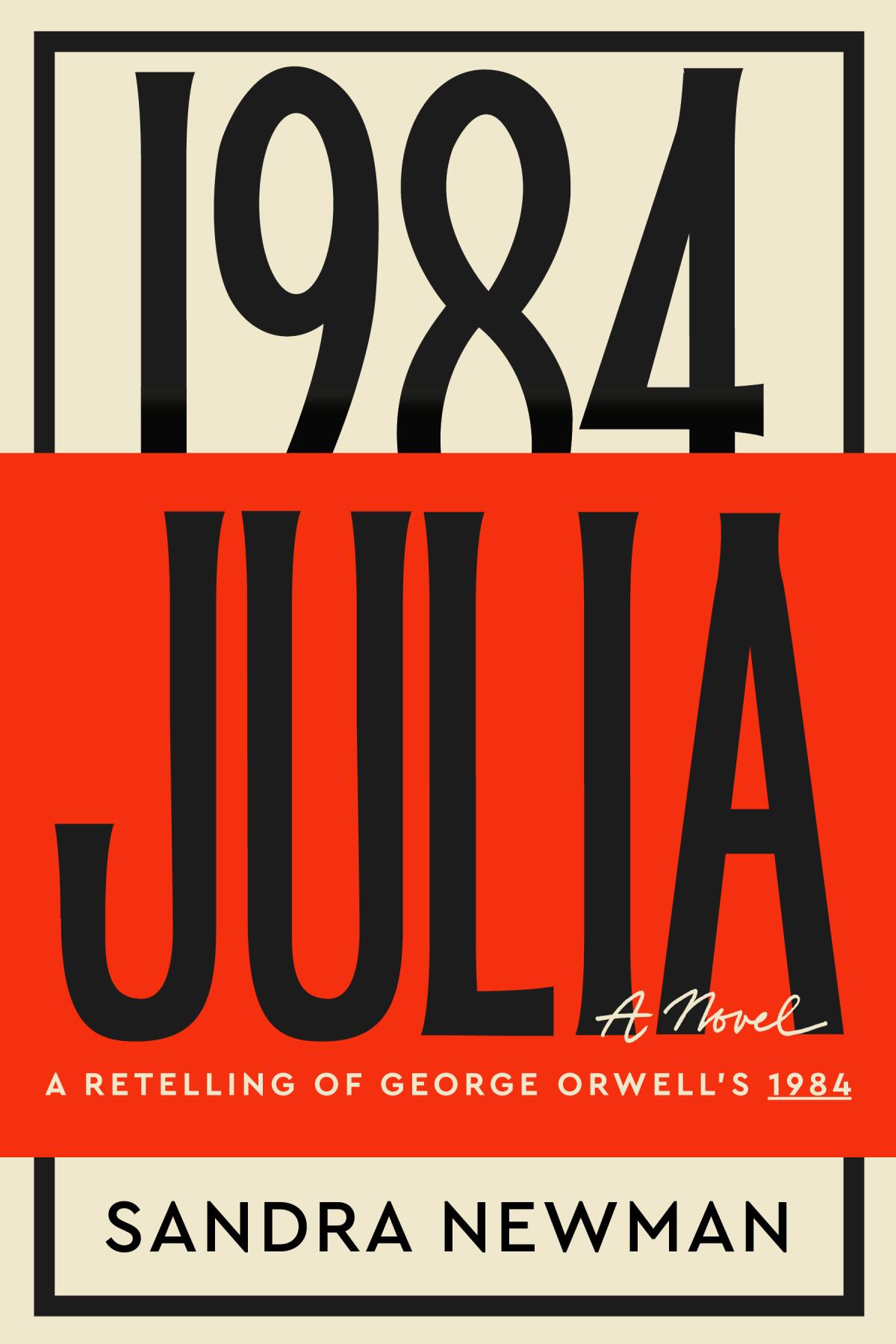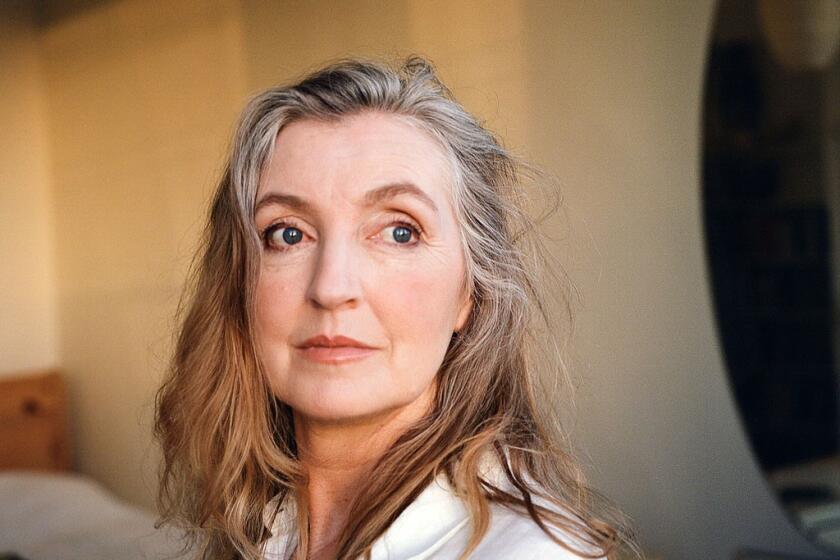A feminist take on Orwell’s ‘1984’ reads like the original — only better

Review
Julia
By Sandra Newman
Mariner: 400 pages, $30
If you buy books linked on our site, The Times may earn a commission from Bookshop.org, whose fees support independent bookstores.
The literary term “anastrophe” refers to the technique of reversing word order in a sentence for effect. (Yoda, think of.) Some retellings of celebrated stories enact a kind of anastrophe on a higher level, lifting one author’s plot to another author’s purpose — and in the process reversing the polarity of the story.
Some of the strongest examples include “Wide Sargasso Sea,” Jean Rhys’ postcolonial “Jane Eyre” prequel; Helen Oyeyemi’s “Snow White” remix “Boy, Snow, Bird”; and Barbara Kingsolver’s recent Dickens reboot “Demon Copperhead.” Sandra Newman’s new entry in this small canon, “Julia,” is explicit about its task; the cover tells us it’s “A Retelling of George Orwell’s 1984.”
That source text remains one of those books everyone knows about and many read in high school. Having read something does not guarantee recalling everything about it; most people might remember “Room 101” and that startling first line: “It was a bright cold day in April, and the clocks were striking thirteen.”
‘Men Explain Things to Me’ author Rebecca Solnit digs into the writer’s garden — and its implication for Orwell and history — in ‘Orwell’s Roses.’
On a reread, Orwell’s narrative holds up, in large part due to the asperity of the prose and the prescient description of how fascism can creep into any society that takes freedom for granted. (Trump’s election made it a bestseller again.) While it may not deserve a place alongside the greats, “1984” contains a dreadful power, weaving many threads of betrayal into a devastating ending.
It must have been daunting for Newman to take on its retelling. Well known for her dystopian novel “The Country of Ice Cream Star” as well as “The Heavens,” a dreamy look into the life of purported Shakespearean muse Emilia Lanier, Newman drew some controversy in 2022 with “The Men,” in which all humans with a Y chromosome disappear from the earth. Trans activists believed Newman negated the lives of people with Y chromosomes. Newman refuted these critiques and defended her book’s validity.

This might matter to those who read “Julia,” for which Newman was chosen by the Orwell estate (his son Richard Blair is his executor, though others made the final selection) — or it might not. Suffice it to say that “Julia” is most certainly a feminist anastrophic version of “1984,” in which Winston Smith’s slightly mysterious lover, Julia Worthing, takes center stage. According to “1984” lore, there are two elements missing from the original: First, why is Julia attracted to Winston? Second, how does she rise so high in the Party so quickly?
Newman’s Julia, whom we meet as she bicycles back to her women’s hostel in order to unclog a toilet, grew up in a SAZ, or “Semi-Autonomous Zone.” Yes, England is still known as Airstrip One and Big Brother is still watching you. Newman has been careful to preserve many of Orwell’s best conceits and jargon, including Newspeak, which has the hostel inhabitants telling each other a snack is “doubleplusgood” and office mates referring to “Ownlife,” or time spent in solitude, which everyone regards with suspicion.
But the SAZ is Newman’s invention, and so is Julia’s history. She grew up with parents who resisted the Party, but when circumstances force a complicated choice, she isn’t one for half-measures. She works in the Ministry of Truth in, of course, the Fiction Department, as a mechanic helping machines run smoothly so they can create gripping yarns like “Revolution’s Victory: All for Big Brother” and “War Nurse VII: Larissa.”
The author of “The Handmaid’s Tale” and “The Testaments” unpacks the way “all speculative fiction writers are writing about the present and the past.”
Our Julia, however — and you’ll start thinking of her that way too — also has a sultry side. Orwell described her as “a rebel from the waist down,” and Newman gives her a slightly smutty history in the Ministry’s pornographic section, where she appeased the lower ranks with titles including “Inner Party Sinners: ‘My Telescreen Is Broken, Comrade!’”
Hearing Julia recall her various sexual exploits not only makes her human, it gives you the sense she really knows herself — what she wants, what she can do without and what she’s willing to accept in a pinch (or, more accurately, in a clinch). She revels in alfresco couplings, some same-sex action and a bit of mild BDSM.
Eventually, we’ll learn the sad story behind Julia’s sexual liberty. Meanwhile, the Winston of “Julia” has little to recommend him. Everyone in their office calls him “Old Misery Smith.” He can’t even rise to the occasion (innuendo intended) when Julia finally secures a room for their first assignation. Since we know Julia has had plenty of experience, Winston’s flaccid personality seems less a commentary on people with Y chromosomes than a knock on one specific erstwhile hero.
Newman solves the enduring mysteries of Orwell’s Julie without resorting to twisty or outlandish machinations. Her additions accord with the original on the level of both plot and language. The twists do eventually come — and you may think you’ve found one in a scene involving rats. (You remember the rats, don’t you? Don’t tell me you don’t.) For a different writer, that would have been enough. Newman, however, transcends that chilling scene with a denouement both surprising and satisfying — one that proves Julia Worthing worthy of her own narrative and her own fate.
Anna Funder’s ‘Wifedom’ unearths the story of Eileen Blair, who died young after suffering mightily from George Orwell’s mistreatment and neglect.
Even more surprising and satisfying is the book’s last line, a literary homage to a different (and truly great) author whose approach to women and sex was utterly unlike Orwell’s.
Newman hasn’t proved herself a worthy successor to Orwell; she’s outclassed him, both in knowledge of human nature and in character development. “Julia” should be the new required text on those high-school curricula, a stunning look into what happens when a person of strength faces the worst in humanity, as well as a perfect specimen of derivative art that, in standing on another’s shoulders, can reach a higher plane.
Patrick is a freelance critic, podcaster and author of the memoir “Life B.”
More to Read
Sign up for our Book Club newsletter
Get the latest news, events and more from the Los Angeles Times Book Club, and help us get L.A. reading and talking.
You may occasionally receive promotional content from the Los Angeles Times.









